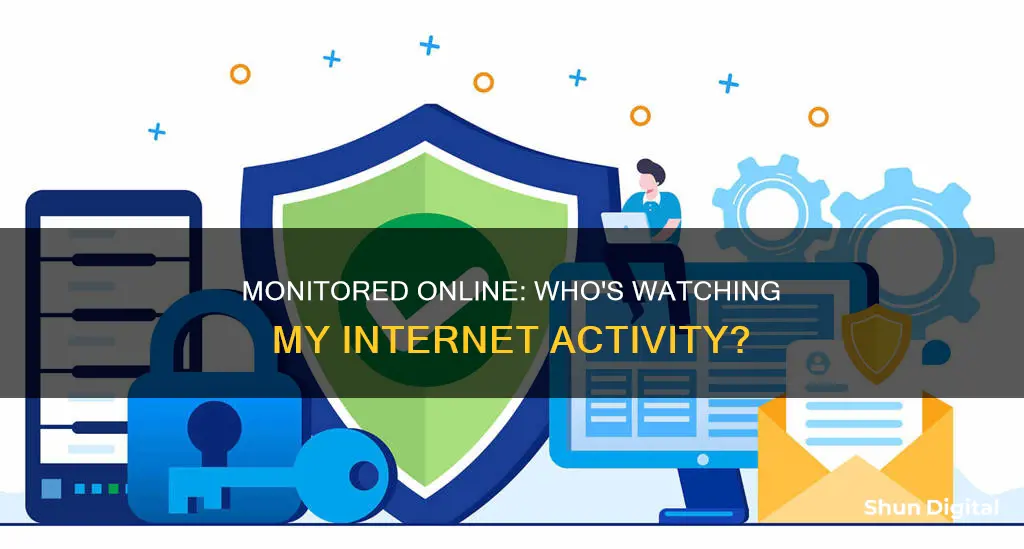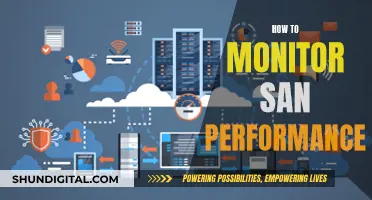
With the increasing digitisation of our lives, concerns about privacy and data security have also increased. One common concern is whether someone is monitoring your internet activity. This could be an employer, a family member, or even a third-party spying program. While not all monitoring methods can be detected, there are certain steps you can take to check if your online activities are being watched. This includes checking your taskbar for suspicious programs, reviewing your firewall settings, and examining active processes on your computer. Additionally, certain routers with advanced capabilities can provide detailed information about websites visited and pages accessed within a domain. However, it's important to remember that monitoring someone's web browser history without their consent raises ethical concerns.
| Characteristics | Values |
|---|---|
| How to detect monitoring | Check the taskbar for suspicious programs |
| Check the "Exceptions" tab in "Windows Firewall" for unknown programs | |
| Check "Processes" in Windows Task Manager for processes running under a different username | |
| Check LAN settings in Internet Explorer to see if a third party can log your activity | |
| Monitoring through a router | Routers can show IP addresses of connected devices and traffic |
| Newer routers can provide more detailed information about website visits | |
| Parental control family security software can be used to monitor in-depth browsing history | |
| Routers can be used to block certain websites | |
| Monitoring tools | Router's built-in tools |
| Third-party programs | |
| Smartphone operating system settings | |
| ISP's home network management app |
What You'll Learn

Can my employer monitor my internet usage?
Yes, your employer can monitor your internet usage. However, the extent to which they can do so depends on several factors, including the device you are using, the network you are connected to, and the security measures in place.
Using a Company-Provided Device
If you are using a device provided by your employer, they can potentially monitor all of your activities, regardless of the network you are connected to. This is because they have administrative access to the device and can install monitoring software or remote access tools without your knowledge.
Using Your Own Device on a Company Network
When using your personal device on a company network, your employer may still be able to monitor your internet usage to some extent. They can track your online activities by analysing network traffic, especially if you are not using encrypted connections (HTTPS). They may also have tools in place to intercept encrypted data or install certificates on your device that allow them to decrypt and inspect secure connections.
Additionally, your employer can monitor DNS (Domain Name System) queries, which are used to translate website addresses into IP addresses. Even if the content of your web browsing is encrypted, your employer can still see the websites you are visiting by analysing DNS queries.
Using Your Own Device on a Personal Network
In this scenario, your employer's ability to monitor your internet usage is limited. However, if you are using a work email account or other work-related applications on your personal device, your employer may still have some visibility into your activities. For example, if you are syncing data between your personal and work devices, your employer may have access to certain types of information, such as browser history or app usage.
Ways to Monitor Internet Usage
There are several methods that employers commonly use to monitor internet usage:
- Router monitoring: Many routers and modems have built-in tools that allow administrators to see how much data each device on the network is using. This can include usage by device, website, or application.
- ISP apps: Internet Service Providers (ISPs) often offer apps that provide insights into data usage, including which apps or websites are using the most data. These apps may also allow employers to set usage limits or restrict access to certain websites.
- Third-party tools: Employers can use third-party software or programs to monitor internet usage in real time. These tools can provide detailed information about data usage, including websites visited and applications used.
- Device settings: On smartphones and tablets, built-in settings can be used to monitor and limit internet usage. For example, iOS and Android devices allow users to see data usage by app and set data limits or restrict cellular data for specific apps.
Protecting Your Privacy
To protect your privacy, it is essential to use secure connections (HTTPS) whenever possible and to avoid accessing personal accounts or sensitive information on company-provided devices or networks. Additionally, be cautious when syncing data between personal and work devices, as this could inadvertently share private information with your employer.
Remember that even if you are not actively monitored, your employer may still have the ability to access and inspect your internet usage if they choose to do so. Therefore, it is always best to assume that your activities may be visible to them and act accordingly.
Taiwan's Utilities: Monitoring Residential Peak Usage?
You may want to see also

Can my family monitor my internet usage?
Yes, your family can monitor your internet usage in several ways. Monitoring software, for instance, can track keystrokes and take screenshots of internet activity on a computer. This type of software can provide transcripts of instant messaging conversations, emails, and social media posts. It can also generate reports detailing which sites have been accessed, the time spent on each site, and the frequency of visits. Additionally, your family members can set up iOS and Android profiles for you on your devices, allowing them to restrict apps and games, block websites, and set time limits on internet usage.
Parental monitoring of internet activity is often driven by safety concerns. It can help protect against cyberbullying, sexting, online predators, and exposure to inappropriate content. By monitoring your internet usage, your family can intervene if you encounter any dangers or risks online. They can also help safeguard your personal information and protect your reputation by ensuring that nothing damaging is posted about you.
While some may view parental monitoring as an invasion of privacy, others argue that it is a responsible measure to ensure the online safety and well-being of children and teens. It is important for families to strike a balance between supervision and respecting your privacy as you grow and gain independence.
If you are concerned about your family monitoring your internet usage, open communication is essential. Discuss your concerns with them and try to understand their perspective as well. It is important to build trust and set boundaries that respect your privacy while also addressing any safety concerns they may have.
Monitoring Linux Memory Usage: A Comprehensive Guide
You may want to see also

Can I monitor my internet usage on my router?
Yes, you can monitor your internet usage on your router. Most routers have built-in data tracking tools that allow you to see how much data each device on your network uses. You can access this information by logging into your router's web-based interface or admin settings page. You will need your IP address and login credentials to do this. Once logged in, you can go to the router's settings or status page to view usage information about all connected devices.
Newer routers may also allow you to set usage limits or restrict access to certain websites. You can also use third-party applications for more detailed statistics or if your router doesn't track data usage. For example, Wireshark is a third-party network analyser tool that can be used for in-depth monitoring of your network traffic.
It's important to note that monitoring internet usage on a router may raise ethical concerns, especially if you are monitoring the activity of other people without their knowledge or consent. Additionally, older routers may not have the capability to track detailed information such as the specific websites visited.
Monitoring Rust Game Servers: Tracking RAM Usage
You may want to see also

Can I monitor my internet usage on my smartphone?
Yes, you can monitor your internet usage on your smartphone. There are several ways to do this, including:
- Using your smartphone's built-in tools: On an iPhone, go to the "Cellular" section in the Settings app to view data usage and set limits. On Android, go to the "Data usage" section in the Settings app.
- Using your ISP's app: Many internet service providers offer apps that allow you to monitor and manage your data usage, set usage limits, and set up parental controls.
- Using third-party apps: Apps like Opera Max (for Android) and My Data Manager (for iOS and Android) can track your data usage and suggest ways to save data.
Monitoring your internet usage can help you avoid overage fees, identify any issues with your home network, and make informed decisions about your data plan. It is a useful way to keep track of your data consumption and ensure you don't exceed your limit.
Monitoring iPhone GB Usage: Tips and Tricks
You may want to see also

Can I monitor my child's internet usage?
As a parent, it is understandable to want to monitor your child's internet usage to ensure they are safe from online dangers and inappropriate content. There are several methods you can use to monitor and control your child's online activity.
Router Monitoring
One way is to utilise your wireless router. Some routers have built-in tools that allow you to monitor data usage and see how much data each device on your network uses. You can log in to your router's web-based interface to access these features, usually by entering its IP address into your browser's address bar. Once logged in, you can view usage information and even set usage limits or restrict access to certain websites.
ISP's Home Network Management App
An easier way to monitor internet usage is through your Internet Service Provider's (ISP) home network management app. Many ISPs offer apps that allow you to view data usage, set usage limits, and set up parental controls. These apps often include features to manage your WiFi network, such as scheduling times when the WiFi is turned off.
Third-Party Tools
There are also third-party tools available, such as GlassWire, which runs on your computer and monitors internet usage in real-time, providing detailed information about data usage.
Built-in Tools on Devices
You can also monitor internet usage directly on your child's smartphone or tablet using the built-in tools on the device's operating system. For example, on an iPhone, you can go to the "Cellular" section of the Settings app to view data usage and set usage limits.
Parental Control Software
Additionally, you can utilise parental control software, which can help monitor and control your child's internet usage. Examples include Norton Family, Qustodio, and Mobicip. These tools often include features such as screen time limits, content blocking, and location tracking.
Manual Monitoring
A more direct approach is to manually check your child's browser history, as all internet browsers save a record of visited sites. However, children can easily delete their browsing history, so this may not be the most effective method.
While monitoring can help, it is important to encourage your child to be a responsible internet user by being a good role model and having open conversations about online safety. Teaching your child about protecting themselves online and the importance of privacy can help them make better decisions when navigating the internet.
IBM Employee Internet Usage: Monitored or Not?
You may want to see also
Frequently asked questions
There are a few ways to detect if your internet usage is being monitored. First, check your taskbar for any suspicious programs that may be monitoring your network activity. Next, open the Windows Start menu, select "Control Panel", and click "Windows Firewall" to view all programs that have been granted access to your computer. If you see something strange, be sure to investigate further. Lastly, open Internet Explorer, click "Tools", select "Internet Options", choose "Connections", and click "LAN Settings". If the check box under "Proxy Server" is checked and you see a local IP address, it means that your web activity is being logged by a third party.
Internet activity can be monitored through a router, as routers can track the IP addresses of connected devices and their traffic. Newer routers may also provide more detailed information, such as the websites visited, the time of the visit, and the specific pages accessed within a domain. Additionally, parental control and family security software can be used to monitor and control internet activity, allowing for the blocking of specific websites or content.
There are several parties that may have an interest in monitoring your internet activity. Employers and family members may secretly monitor their networks to prevent the viewing of inappropriate content or to avoid legal liability issues. Additionally, your internet service provider (ISP) may also monitor your internet usage to track data consumption and provide related services or notifications.







